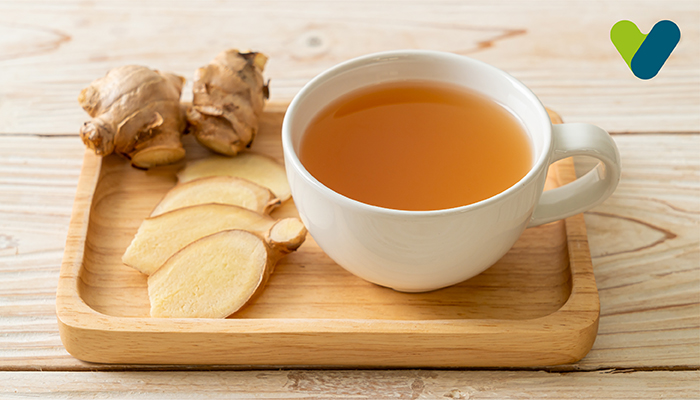Ginger is a powerful flavoring agent from Southeast Asia and is now used in cuisines worldwide. In addition, traditional folk medical practices from Asia incorporate Ginger as one of their healing elements, using it in several of their medications, rituals, and customs. It has also been incorporated into modern cosmetics and homemade cosmetic remedies.
Ginger was imported as one of the primary oriental spices from Africa and Asia to Arab nations and Europe, a popular condiment, especially in Greece, Italy, Iran, Iraq, and other European countries. It is used in multiple ways – fresh, dried, powdered, pickled, juiced, or oil.
The popularity of Ginger is gained through not just its robust flavor but also because of its healing effects and medicinal properties. Thus, it is a must-have ingredient for all individuals and can significantly help women during pregnancy.
Best Ways To Include Ginger During Pregnancy
Ginger has a powerful flavor that many people find too spicy. Several cuisines use Ginger as a staple ingredient. For those who do not see those cuisines as appetizing, ginger tea is the best way to incorporate Ginger into everyday diets.Benefits Of Ginger During Pregnancy
Ginger helps with the refinement of the digestive tract, treating conditions like nausea, gastritis, flatulence, motion sickness, and food poisoning. It is excellent for sore throats because of its anti-inflammatory, anti-fungal, and anti-microbial properties. All of these characteristic features are requirements of women during pregnancy.Ginger during pregnancy delivers perks such as:
1. Nausea and morning sickness –
Almost 80% of women experience morning sickness during their pregnancy. Ginger has helped bear chemotherapy-related nausea and side effects as well. Ginger tea in pregnancy can reduce the feeling of nausea. Morning sickness can be eradicated by sniffing ginger chunks or Ginger infused aromatic elements too.
2. Digestion –
Ginger in pregnancy helps improve saliva secretion and digestive enzymes. Ginger regulates digestive tract functions, cleanses the body of toxins, and promotes comfortable digestion. As a result, indigestion, constipation, flatulence, and body heat can be controlled. Ginger tea in pregnancy helps relieve gas, regulate digestive enzyme release, and maintain body heat, thus improving overall metabolism during pregnancy. Ginger tea helps decrease bloating and discomfort in pregnant women.
3. Joint pain –
Ginger is also known to relieve joint pain and cramps. Leg cramps and back pain which are common occurrences in pregnancy can be reduced with sufficient ginger intake. Osteoarthritis is known to be treated with Ginger in many regional medical practices. Ginger tea can help tolerate conditions like osteoarthritis.
4. Inflammation –
A common discomfort during pregnancy is inflammation and bloating, which can be treated almost immediately with ginger tea. Too much inflammation can be harmful to the mother and the baby. Ginger has active anti-inflammatory properties, which can help avoid such complications.
5. Blood circulation and cholesterol levels –
‘Salicylate,’ a natural acidic component found in Ginger, acts as a blood thinner. Salicylate in ginger tea during pregnancy is very helpful as it avoids unnecessary clots, improves easy circulation, and comfortable blood supply to the fetus. Overall cholesterol levels are also maintained to an extent. Ginger tea has components that activate enzymes involved in regulating and maintaining cholesterol levels during pregnancy.
6. Sugar level maintenance –
More than 3% of women experience gestational diabetes. Losing track of sugar intake during pregnancy can become fatal if neglected for too long, leading to complications during labor. Ginger helps maintain blood sugar levels through proper metabolism. Keeping a keen eye on sugar and carbohydrate intake is highly advised, in addition to consuming 1 to 2 cups of ginger tea during pregnancy.
7. Throat irritation –
Ginger’s anti-microbial and anti-fungal properties make it great for buccal health. It eliminates mouth odor, rids the throat of microbial growth, and is excellent for improving immunity.
8. Oxidative stress –
Ginger tea is known for its antioxidants. It can reduce oxidative stress and release the body of toxins. Ginger tea during pregnancy can help maintain a toxin-free metabolism by quickly omitting toxins.
How To Make Ginger Tea –
Ginger tea follows a simple procedure. It is important to clean with fresh water as Ginger is likely to have dirt accumulations.- Peel and clean a few chunks of Ginger
- Add to pan with boiling water
- Simmer for at least 15 minutes
- Filter out the ginger slices
- Add lemon and honey to ginger-infused water
Are There Any Side Effects To Including Ginger In Pregnancy –
The ‘gingerol’ component in Ginger is known to be the inducer of the characteristic spice punch of Ginger. It is also one of the components of ‘shogaol’ and ‘paradol’ that heighten Ginger’s antitumor and antioxidant properties. But gingerol in high concentrations can be overwhelming on the body’s metabolism. Given that the metabolism of pregnant women is already on overload, too much ginger consumption can lead to exhaustion. Dried Ginger has higher concentrations of ‘gingerol’ and needs to be avoided. Fresh Ginger infused food can be permitted for safe consumption for women during pregnancy. Any ingredient taken on overdose is not beneficial for women in pregnancy. Hence exercising ginger consumption in moderation through ginger tea is suggested.There are no side effects to consuming Ginger during pregnancy. However, if there are signs of irritation or allergic reactions, consulting a doctor before continuing with ginger consumption is advised. In pregnancy, the acceptable amount of Ginger is 1 gram per day, found in 900ml of ginger tea. Hence 2 cups of ginger tea per day are the allowable quota. Avoid consuming too much ginger tea during pregnancy.
However, Ginger is to be avoided during the late stages of pregnancy. It has been reported as a risk of bleeding. Women with a history of miscarriages, preterm labor, blood clotting issues, and other complications surrounding pregnancy are suggested to stay clear of too much ginger consumption.
